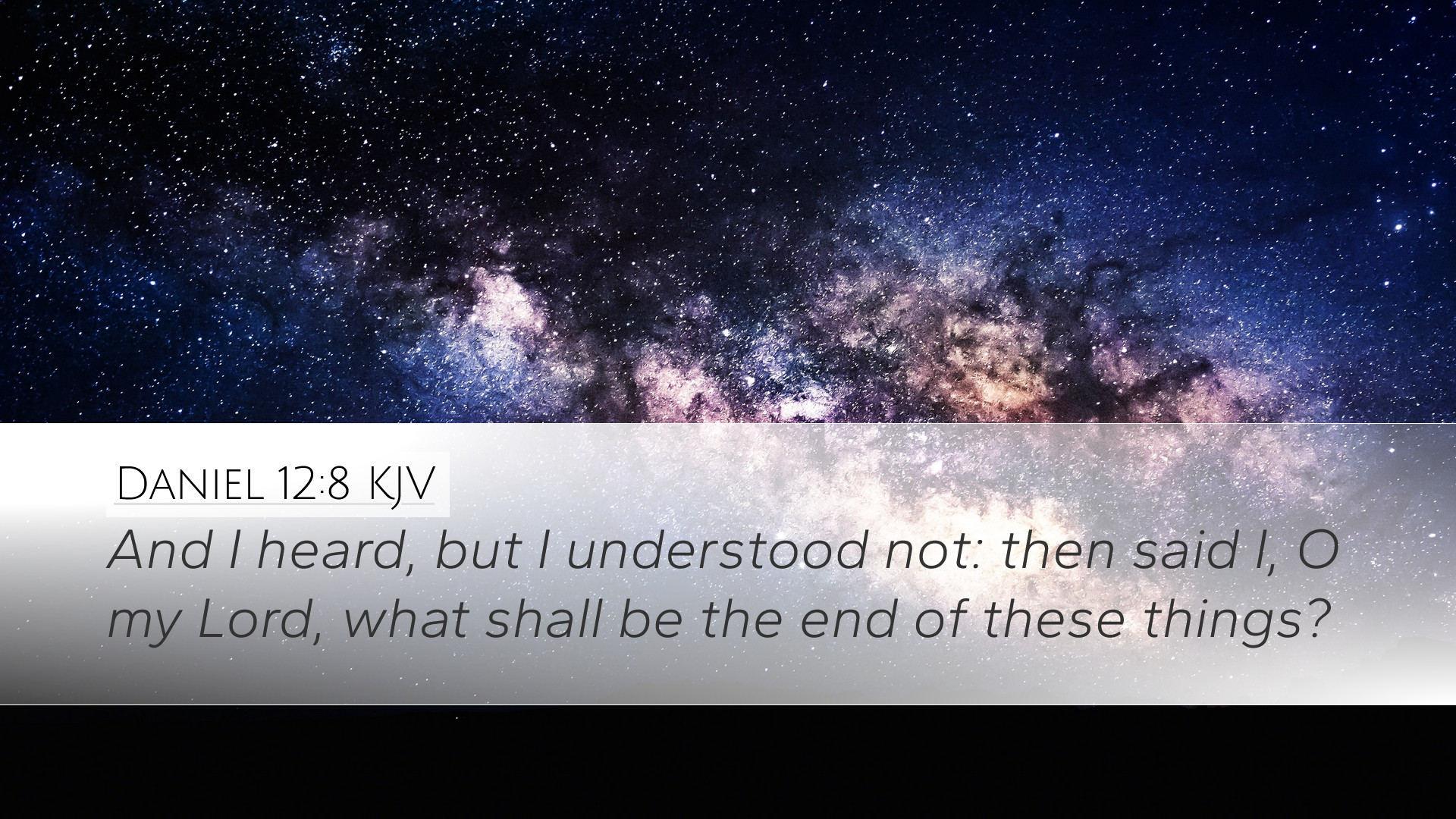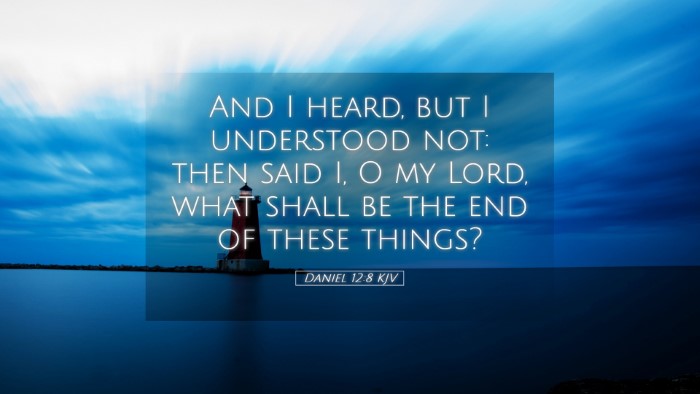Old Testament
Genesis Exodus Leviticus Numbers Deuteronomy Joshua Judges Ruth 1 Samuel 2 Samuel 1 Kings 2 Kings 1 Chronicles 2 Chronicles Ezra Nehemiah Esther Job Psalms Proverbs Ecclesiastes Song of Solomon Isaiah Jeremiah Lamentations Ezekiel Daniel Hosea Joel Amos Obadiah Jonah Micah Nahum Habakkuk Zephaniah Haggai Zechariah MalachiDaniel 12:8
Daniel 12:8 KJV
And I heard, but I understood not: then said I, O my Lord, what shall be the end of these things?
Daniel 12:8 Bible Commentary
Commentary on Daniel 12:8
Daniel 12:8 states: "And I heard, but I understood not: then said I, O my Lord, what shall be the end of these things?" This verse encapsulates a moment of deep inquiry and concern as the prophet Daniel grapples with revelations about the end times.
Contextual Overview
This chapter marks the conclusion of the Book of Daniel, a text rich in apocalyptic literature. Here, Daniel is presented with significant prophetic visions concerning the future of Israel and the world. The previous verses (Daniel 12:1-7) reveal themes of resurrection, judgment, and the ultimate vindication of God's people, creating a backdrop for Daniel's moment of confusion.
Insights from Public Domain Commentaries
Matthew Henry
Matthew Henry highlights Daniel's perplexity as a reflection of the complexity and weight of divine revelations. He notes that Daniel, despite being favored with visions, often finds himself at a loss for understanding their implications. Henry suggests that this illustrates a common spiritual experience — receiving communication from God that challenges human comprehension.
- Human Limitation: Henry emphasizes humanity's limitations in grasping divine knowledge, showcasing an essential humility before God.
- Desire for Understanding: He notes that Daniel's plea, "What shall be the end of these things?" reflects a deep human desire to comprehend the future, a quest echoed throughout Scripture.
- The Role of God’s Revelation: Henry asserts that God often reveals truths progressively, aligning with His sovereign timing, which calls for patience and faith from believers.
Albert Barnes
Albert Barnes approaches the verse as a demonstration of the uncertainty surrounding prophetic events. Barnes points out that Daniel's inquiry prompts reflections on the nature of prophecy itself.
- The Complexity of Prophecy: He suggests that God does not disclose all things at once, often leaving parts of His plan shrouded in mystery until the appointed time.
- Human Response to Divine Mystery: Barnes elucidates that the proper response to divine mysteries is neither despair nor skepticism but rather a pursuit of deeper understanding through prayer and faithful seeking.
- End Times Revelation: He speculates on the end times, indicating that such prophecies are designed not just for information but to cultivate hope and resilience among God's people.
Adam Clarke
Adam Clarke provides a detailed analysis of the texts leading up to Daniel 12:8 and the themes of knowledge and wisdom that permeate this section. Clarke identifies a critical tension between the knowledge provided and the comprehension of that knowledge.
- The Pursuit of Knowledge: Clarke believes that the repeated encounters between Daniel and the celestial messengers emphasize the significance of acquiring spiritual wisdom, suggesting that true understanding is a gradual process requiring divine assistance.
- The Question of Finality: He interprets Daniel's question as not merely a quest for information but a profound longing for assurance about the fate of Israel and the faithful.
- God's Assurance: Clarke draws attention to God's overarching plan, implying that although Daniel may struggle with understanding, God's providence remains intact and purposeful.
Theological Reflections
In synthesizing these insights, several theological themes emerge that resonate deeply with the pastoral and scholarly communities.
1. The Mystery of Divine Revelation
Daniel's inquiry reflects a fundamental aspect of the Christian experience: the struggle to understand God's plans. This theme emphasizes that while the faithful may not always grasp the entirety of divine revelation, they are called to trust in the goodness and sovereignty of God.
2. The Nature of Prophetic Insight
Understanding prophecy requires careful discernment and a recognition of its layered meanings. The verse illustrates that prophetic truth can be multivalent, demanding a posture of humility and ongoing engagement with Scripture.
3. The Importance of Community and Teaching
Pastors and theologians are reminded of their role in guiding the community towards comprehension of God's word. This verse signals the importance of teaching and interpretation within the church, fostering a communal pursuit of understanding.
4. Hope in Uncertainty
Lastly, Daniel 12:8 encapsulates the reassurance that even amid uncertainty, believers can find hope. The struggle for understanding does not diminish God's ultimate plan. Rather, it refines faith, urging believers to lean into the mystery of God’s work while holding fast to the hope of salvation.
Conclusion
In conclusion, Daniel 12:8 not only addresses the prophet's immediate concern but invites all readers into a larger narrative of faith, mystery, and divine engagement. The insights drawn from Matthew Henry, Albert Barnes, and Adam Clarke remind us that the quest for understanding is an intrinsic part of the spiritual journey, one that calls us deeper into relationship with God in all His unveiling of truth.


